
SLA - the diagnosis no one wants to hear. Episode 38
For people diagnosed with amyotrophic lateral sclerosis (SLA), the diagnosis does not bring hope, but becomes a sentence with no possibility of escape. In the latest episode of the programme 'Po pierwsze Pacjent', Monika Rachtan talks to Dr Kamila Żur-Wyrozumska, a specialist in neurology, about the challenges faced by patients and doctors when facing this incurable disease. It is a moving conversation about the human dimension of suffering, hope and unimaginable courage, and about seeking light where there is darkness, fighting for every day that is still left to live.
Amyotrophic lateral sclerosis
Amyotrophic lateral sclerosis (SLA), also known as Lou Gehrig's disease, is a serious and rare condition that attacks motor neurons in the brain and spinal cord. This leads to a progressive loss of the ability to move, speak, swallow and breathe. The disease has three main forms: sporadic, accounting for approximately 90% cases, with no direct link to hereditary factors; familial, comprising 5-10% cases with clear inheritance; and atypical, which combines SLA with other disorders.
SLA is a relatively rare disease, affecting approximately 2 per 100 000 people per year. It is most common in middle age, although it can also occur in younger people. The diagnosis of SLA is based on a detailed clinical picture and test results, which help to rule out other possible causes of the observed symptoms. Despite advances in research, amyotrophic lateral sclerosis remains an incurable disease, with limited therapeutic options that may slightly prolong survival but have limited impact on improving patients' quality of life.
The majority of people with a diagnosis of SLA survive 2 to 3 years after the onset of the first symptoms, but approximately 25% patients live 5 years, with 5-10% experiencing longer survival. The specificity of atypical cases of SLA, where the disease co-occurs with other neurodegenerative disorders, means that diagnosis and treatment can be extremely challenging, highlighting the need for ongoing research into better methods of diagnosing and treating this complex disease.
Symptoms
Spotting the first signs of amyotrophic lateral sclerosis (SLA) can be difficult, but there are clear signals that should prompt you to think more deeply and seek medical advice. Here are some that may be worrying harbingers of SLA:
- unexpected muscle weakness,
- speech disorders,
- swallowing difficulties,
- muscle fibrillation,
- a sense of constant fatigue.
These signals are like silent alarms that your body sends out, suggesting that something may not be working properly. If you are experiencing these symptoms, especially in combination or with a progressive nature, it is crucial not to underestimate them, but to take action and consult your doctor. Early diagnosis and intervention can make a significant difference to SLA management and quality of life.
Diagnosis and what next?
Once a diagnosis of SLA is received, it becomes paramount for patients and their families to manage their daily challenges and maintain the best possible quality of life. Treatment focuses primarily on alleviating symptoms - such as muscle weakness, speech and swallowing problems - and trying to maintain function and independence for as long as possible.
Although stem cell transplants and some novel approaches, such as gene therapy, are being extensively researched, we currently do not have a drug that can cure SLA. The currently available drugs, such as riluzole, can only slightly prolong the life of patients. Rehabilitation support, proper nutrition and avoidance of infections are also extremely important and can make a significant difference to the wellbeing of people struggling with this disease.
As SLA progresses, a key aspect of care becomes ensuring the patient's comfort and dignity, especially in the final stages of life. Palliative care focuses on minimising discomfort and suffering, as well as emotional support for the patient and family. SLA ultimately leads to respiratory failure, which is the most common cause of death.
Hopes for the future lie in current research into new treatments, including gene therapy, which may offer new options for people with SLA in the future. Although at the moment there is no cure for SLA, advances in science offer hope for a better tomorrow.
Between hope and reality - a doctor's testimony about living with SLA
In a medical world where daily challenges are intertwined with personal pursuits, Dr Kamila Żur-Wyrozumska sheds light on one of the most moving medical mysteries - amyotrophic lateral sclerosis (SLA). Struggling with inevitability and suffering, this disease requires doctors to have not only unwavering medical knowledge, but also a deep understanding of the human condition. The guest of the episode shares his experiences, recounting the moments when he had to communicate the diagnosis of SLA to patients and their families - a moment full of emotional heaviness, where words become the bridge between medical certainty and human hope. These intimate encounters with patients reveal a deeply personal dimension to the doctor's work that goes far beyond cold statistics and medical procedures. The stories of patients such as Tomek, who runs a hotel in Italy, or Krzysiek, a father and husband struggling to get through each day, paint a picture of life in the shadow of SLA, where every day is a precious gift and every moment spent together with loved ones becomes a treasure.
At the same time, the interview emphasises the importance of education and reliable information in the fight against the disease. Dr Żur-Wyrozumska speaks passionately about the need to combat misinformation and charlatanism that threatens patients in their search for relief. Her commitment to spreading realistic knowledge and supporting patients on their journey through illness, demonstrates the importance of the doctor's role as a guide and support during these difficult times.
How do doctors help patients face SLA?
Making a diagnosis of SLA is one of the most difficult moments in medical practice, requiring not only in-depth medical knowledge, but also empathy and understanding of the patient's emotional state. Dr Kamila Żur-Wyrozumska emphasises that neurology specialists are involved in the process of supporting patients from the moment of diagnosis, through treatment, to daily care. Their work extends beyond the boundaries of their offices to include education, psychological care and physiotherapy, becoming a foundation in the lives of those struggling with the disease.
During the diagnosis process, delicacy in communicating information, balancing between the difficult truth and maintaining hope, plays a key role. Specialists in neurology , in close cooperation with psychologists and therapists, form a multidisciplinary team that becomes a support not only for the patient but also for his or her family. As a result, patients can count on comprehensive care, focusing not only on the medical aspects, but also on the emotional and social aspects.
The Patient First programme is available on multiple platforms, including Spotify, Apple Podcasts and Google Podcasts.
Source
1st Spring School 2005: fundamentals of neurodegenerative diseases: https://ptbun.org.pl/archiv/sw05_grieb.pdf
2 Jagiellonian University Repository: https://ruj.uj.edu.pl/xmlui/bitstream/handle/item/273651/tomik_et-al_analiza_zaburzen_fazy_przelykowej_polykania_u_chorych_2006.pdf?sequence=1&isAllowed=y
3. dobropowraca.co.uk - knowledge-base: https://dobropowraca.pl/baza-wiedzy/stwardnienie-zanikowe-boczne-sla/
Transcription
Monika Rachtan
Hi, a very warm welcome to the next episode of the programme "Patient First". Today we are going to talk about amyotrophic lateral sclerosis. Does this term mean anything to you? For me, until a few weeks ago, it did not say much, but that changed when I met Dr Kamila Żur-Wyrozumska, a specialist in neurology, who is our guest today. We are going to talk about SLA. Hi, a very warm welcome to you.
Kamila Żur-Wyrozumska
Hello Monica, hello.
Monika Rachtan
Why did you decide to become a doctor?
Kamila Żur-Wyrozumska
Being a doctor means helping people and dealing with the mysteries of life, pain and illness. It's really fascinating. I also have my own battles with suffering and death.
Monika Rachtan
So that was your main reason. And did the expectations you had when you decided on this path come true?
Kamila Żur-Wyrozumska
I had already prepared myself for this decision a few years earlier. I knew what I wanted to do in life.
Monika Rachtan
Okay, at the age of 19 you start medical school and this difficult job. Then you find yourself in a hospital, on a ward, as a neurologist. Did everything go according to plan
Kamila Żur-Wyrozumska
Not everything, but I have received a great deal. Contact with people still delights me and I learn amazing stories from them. I wonder where so much strength comes from in people.
Monika Rachtan
Let's go back to SLA patients. This is a difficult diagnosis to communicate.
Kamila Żur-Wyrozumska
I have often had to communicate the diagnosis of SLA to patients and their families. I accompany them through their life and suffering, watching their roles and relationships change.
Monika Rachtan
How do you feel about communicating such diagnoses?
Kamila Żur-Wyrozumska
I have to be absolutely sure of the diagnosis. Let me tell you the story of Tom, who noticed a weakness in his hand while playing tennis. He hoped it was just an injury.
Monika Rachtan
So he thought it was something unimportant?
Kamila Żur-Wyrozumska
Yes, but I have observed weakness in other muscles. The process of diagnosing SLA requires ruling out other diseases. I try to make sure the diagnosis is accurate.
Monika Rachtan
How do patients react to the diagnosis?
Kamila Żur-Wyrozumska
Often there is aggression, stemming from a sense of injustice. Patients seek therapy, which is sometimes dangerous because of false promises on the internet.
Monika Rachtan
Why is this dangerous?
Kamila Żur-Wyrozumska
The internet is full of people offering alternative treatments that can mislead the patient. Education and realistic knowledge is important.
Monika Rachtan
What can we do to help?
Kamila Żur-Wyrozumska
Education and spreading knowledge is key. In a crisis, people are very susceptible to suggestion, which creates room for abuse.
Monika Rachtan
Have you considered which is worse SLA or cancer?
Kamila Żur-Wyrozumska
In the case of SLA, I think about dignity and conscious survival. Christopher's story shows different aspects of the disease. I was pregnant at the time, six months pregnant.
Monika Rachtan
Were you working at the time?
Kamila Żur-Wyrozumska
Yes, I was working. I had one-and-a-half-year-old Hania waiting for me at home, and at the time I was pregnant with my second daughter, Eve. Then Krzysiek came with his wife and 9-year-old daughter. This was another centre they came to, because Krzysiek was constantly looking for confirmation that his disease did not exist. After the examination, when I looked at him, his 9-year-old daughter came up, squeezed his hand and looked me straight in the eye. After leaving the surgery, I couldn't shake it for a long time. I had no doubt about the diagnosis - it was SLA. I later changed jobs and for a good few years, maybe six, things got better. Then my daughter Basia was born. Christopher came to my surgery in a wheelchair.
Monika Rachtan
How did this happen?
Kamila Żur-Wyrozumska
He had paresis in his arms and legs, but preserved pad function. That is, he could speak, swallowed and breathed independently, his respiratory function was preserved. He talked about his wife, his daughter and despite everything he was very cheerful. It was our last meeting, but an extremely positive one. In oncology, patients feel they are struggling, taking drugs that often cause pain. SLA treatment is more subtle, but also offers the possibility of prolonging life. It is worth fighting for every minute and, above all, for quality of life.
Monika Rachtan
What do you see in your patients' eyes when you communicate the diagnosis to them? You said it's a very difficult moment.
Kamila Żur-Wyrozumska
Let me tell you about Agnes, who was 44 years old and had four children. Her youngest son was four years old at the time. She was a Silesian and said "Doctor, I'm going to beat this". She was in conflict with her husband, who did not want to accept that she was ill. She asked me to convince him of her illness. Her husband was a wonderful man. He reacted very emotionally, he was not against her treatment, he just could not accept the thought of her illness. He was very supportive.
Monika Rachtan
Because he loved her very much.
Kamila Żur-Wyrozumska
Yes, of course, he loved her very much. He couldn't come to terms with her illness. At the hospital she had a symptom called flail arm, which meant paresis of the hands. She asked me for a drug that would stop her period.
Monika Rachtan
Did you give her the medicine?
Kamila Żur-Wyrozumska
There is no treatment that can do this. One can only prolong the use of contraception. But it is important that the disease does not take away the patient's dignity. The doctor's role is not only to fight for life and health, but also to preserve the patient's dignity.
Monika Rachtan
Are you asking patients what you can do for them?
Kamila Żur-Wyrozumska
Always. It's about getting to know the patient's perspective, their expectations, fears and perceptions. We don't approach the patient just as a disease, but as a specific person with a specific problem.
Monika Rachtan
That is, you can propose something realistic. You don't cure the disease, you cure the person.
Kamila Żur-Wyrozumska
Exactly. I saw a picture on the internet of an elderly lady with SLA that really moved me. Although her eyes hardly moved, they expressed a longing for life. This awareness of the patient to the end is something that scares me.
Monika Rachtan
This is very difficult. You talked about charlatans taking advantage of these patients.
Kamila Żur-Wyrozumska
Unfortunately, there are treatments that do not work and patients are prepared to make great sacrifices. I have encountered many such cases, and I find it frightening.
Monika Rachtan
I have read about stem cell transplants. Is this an effective method?
Kamila Żur-Wyrozumska
No. Most studies do not prove their effectiveness. One well-conducted study confirmed that stem cell transplantation does not prolong life or time to respiratory failure. This method is not recommended.
Monika Rachtan
When a patient with SLA comes to your practice, do you inform them of the treatment options available?
Kamila Żur-Wyrozumska
Yes, because there are disease-modifying drugs.
Monika Rachtan
Are these drugs available in Poland?
Kamila Żur-Wyrozumska
Yes, they are available. For example, Liruzole, which can actually prolong life, recommended by the American Academy of Neurology, is prescribed to every patient in Poland. Other drugs like Edaravon, which is controversial but used in the US and Japan, or Tibi turso, registered in the States, are available, although expensive. There is also Tofersen for patients with SOD1 mutations. We also offer nutritional and rehabilitation treatment options that can realistically prolong life.
Monika Rachtan
Patients would probably like to hear about the chance of a cure.
Kamila Żur-Wyrozumska
Currently, medicine does not offer this opportunity, although we do not stop looking for a cure. Diagnostics, including genetic diagnostics, and genetic therapies are directions we are working on.
Monika Rachtan
Targeted treatment would be ideal.
Kamila Żur-Wyrozumska
Exactly. Not everyone has one gene responsible for the disease. Often multiple genes and environmental factors influence the risk of SLA. It's complicated, but essential to understanding and overcoming the disease.
Monika Rachtan
Can the environment affect the risk of disease?
Kamila Żur-Wyrozumska
Environmental factors are poorly defined. Smoking, heavy physical work or exposure to pesticides are examples, but there is no clear factor whose elimination would significantly reduce the risk.
Monika Rachtan
So it's complicated.
Kamila Żur-Wyrozumska
Yes, and although the rate of progress in SLA research is not spectacular, we must not lose hope. Clinical trials and experimental therapies are underway that may bring breakthroughs.
Monika Rachtan
I see your commitment and willingness to help.
Kamila Żur-Wyrozumska
Fighting for the patient is important and requires commitment. Working with patients and their families requires support and empathy. This is something that drives me in this work.
Monika Rachtan
Today we will not talk about how a patient with SLA passes away. We will focus on finding solutions and on educating young doctors. What would you advise the Minister of Health on the education of medics?
Kamila Żur-Wyrozumska
I observe students and see that although access to information is easier thanks to the internet, it is important to train soft skills and communication skills. Medical students are open and engaged. It is important to teach them to manage stress and protect them from burnout. In the doctor-patient relationship, we should see two people forming a therapeutic team.
Monika Rachtan
That is, we not only treat the disease, but also respond to the needs of the person.
Kamila Żur-Wyrozumska
Exactly. Often patients need to talk and through empathy and taking the time, you can find the real problem. Every visit is an opportunity to build a relationship and a lesson from the patient.
Monika Rachtan
What would you say to high school students considering medical school?
Kamila Żur-Wyrozumska
You have to be hardworking and dedicated to the patient. Medicine is a job that requires sacrifices, but it is also inspiring and allows you to help people.
Monika Rachtan
What are the three most important lessons from our conversation for audiences?
Kamila Żur-Wyrozumska
Illness should not take away dignity. The doctor saves not only lives but also dignity. Life after diagnosis is precious. The support of the patient's entire family is important.
Monika Rachtan
How can we as a society humanise medicine?
Kamila Żur-Wyrozumska
We should focus on the patient's needs, not just their illness. It is important to ask what we can do to make him better.
Monika Rachtan
Thank you for the interview and your work, which shows how important real doctors are in patient care.
Previous episodes
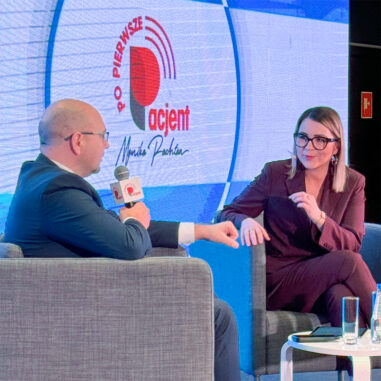
The hardest to call! How does the Patient Ombudsman help? Special episode
Demand quality. Choose facilities that focus on quality and report irregularities to the Patient Ombudsman
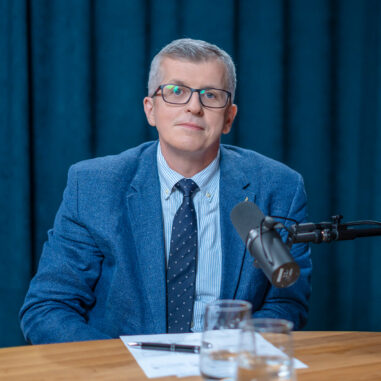
The National Oncology Network - what benefits will the patient gain? Episode 36
Oncology care in Poland plays a key role in the fight against cancer, providing the foundation for a better quality of life for patients
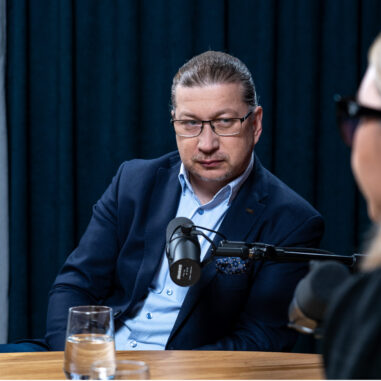
Don't eat, don't drink... or parenteral nutrition. Episode 35
Parenteral nutrition is a method that has been developing in Poland for 40 years.

The heart of music, the power to help. Jurek Owsiak and WOŚP. Episode 34
The Great Orchestra of Christmas Charity has for years been committed to providing modern medical equipment to Polish hospitals
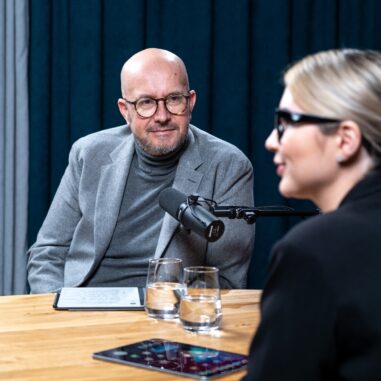
A common language between patient and doctor. Is it possible? Episode 33
Guest of the episode highlights significant challenges in communication between doctors and patients
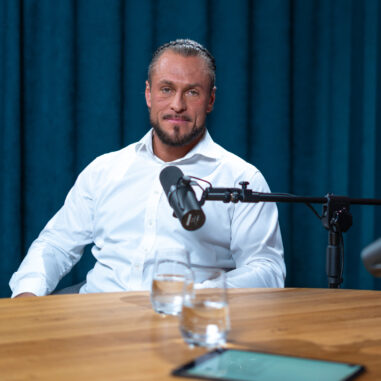
Into the New Year without addictions. What can you do to truly say goodbye to addictions? Episode 32
Emphasising the role of sport in the addiction treatment process is not only a matter of promoting a healthy lifestyle, but also of building awareness of alternative methods of coping with addiction



